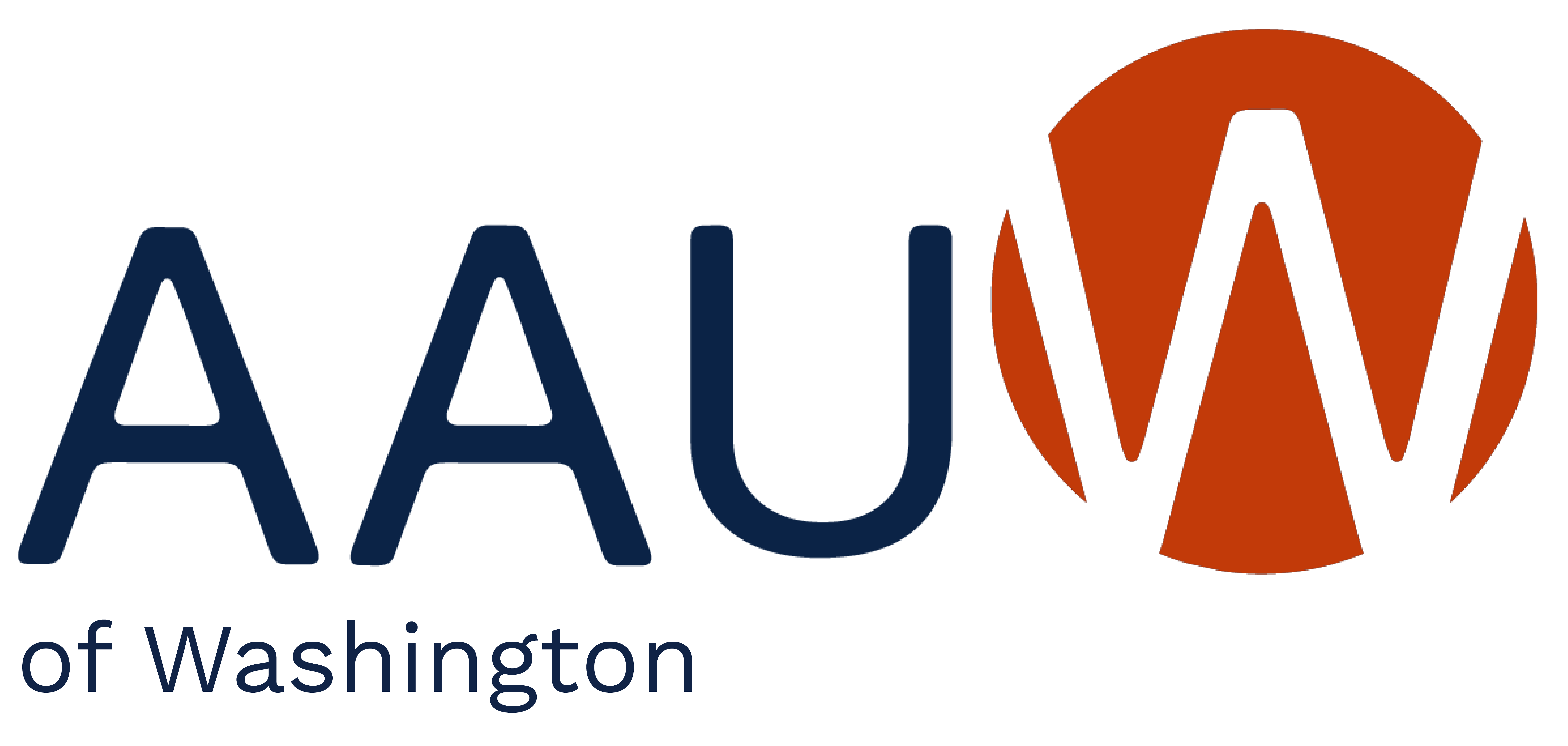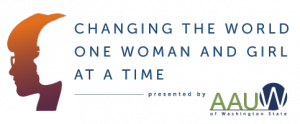State Convention 2016 was a Restful Blast!
AAUW-WA Convention Report
by Gay Armsden
AAUW state conventions are a great way to meet inspiring women, get re-vitalized about working toward our mission, and – last but not least – remind ourselves of the important role the state organization can play in energizing its members. This was my first AAUW-WA convention and it did not disappoint!
Almost 100 AAUW members attended the state convention in April. The two highlights for me were the panel of WA legislators who spoke about the barriers and bias they have faced, and the panel of women who talked about their experiences in other male-dominated professions. The legislators shared sometimes appalling personal stories of discrimination (a judge told one, “You did a good job on the case, for a girl”) and imparted tips on they’ve learned about successful leadership along the way. It was mentioned, for example, that women often have to challenge themselves to not feel responsible for others’ reactions, which inhibits their taking action, and that women are more likely than men to feel that they aren’t qualified to run. The panel moderator, Carolyn Hayek, past president of the Kirkland-Redmond branch and AAUW-WA, reported that it takes women far longer than men on average to decide to run for office. AAUW members can be a resource for young women by helping build their confidence, mentoring them, and using the AAUW program Elect Her to encourage and train college-age women to run for student government and future political office. (Stay tuned for a Catalyst article on the gender gap in political ambition.) Hayek also noted that the percentage of female legislators in WA has been falling; it was 40% between 1999-2000 and has been 31-33% since 2010.
The other convention highlight was the panel on challenging stereotypes about women and girls. AAUW national board director and WA online branch member Rebecca Norlander was moderator. The panelists – a rural-area physician, a cyber forensics expert, and a cargo ship captain — spoke of their occupational experiences, who their models were, and what they would advise other women who aspire to occupations mostly held by men. The ship captain’s stories were particularly interesting; for example, while working in the Middle East, she applied a life-saving tourniquet to the limb of an injured man but he removed it because she was female and subsequently died of his injury. The difference between “mentoring” and “sponsoring” was discussed; sponsors go the next level by helping people advance by opening doors using their position of power. A few of the tips given for women seeking to take positions in fields dominated by men (especially if supervising them) were:
• Take opportunities when they arise, even if you think you can’t do them.
• Remember that certain things are not discussed but are still expected.
• Find a way to connect so that you “match” better, even if it means telling a dirty joke or learning a little of their native language if it’s not English (the ship captain learned Tagalog and Arabic).
• Get people to talk about themselves, showing that you care about them as individuals.
• Get into leadership positions as soon as possible because you want to be at the table where the decisions are made that can affect you and other women.
• Write down your ideas and attach you name to them so others can’t take credit for them.
An important breakout session for me, as the branch Public Policy Chair, was the breakout session on Title IX. Darcy Lees, who served as Equity Coordinator and Civil Rights Program Supervisor at the WA State Office of Public Instruction, spoke about what the federal and state Title IX laws cover. The federal laws covers more than most people think (what surprised me: textbook bias, counseling practices). The WA law is more restrictive than the federal law, covering courses and instructional materials. Also speaking was Herb Dempsey, a retired teacher, who does Title IX data analysis on WA schools’ athletics (and schools in some other states) and who is behind thousands of complaints filed on Title IX violations. He wisely emphasized that “What you don’t measure, you can’t change”. He claims that schools are making it more difficult to find their data online, and that things seem to be getting a little worse regarding equity for girls in athletics. The last speaker was Edmonds-SnoKing AAUW member Phyllis Keiley-Tyler, who chairs the Title IX Project for her branch. She believes hers is the only branch in WA to have taken advantage of AAUW national’s resources for delivering helpful materials to Title IX coordinators in our schools. She offered to be a resource (as did Herb Dempsey) to any branch wanting to be involved in this important activity.
Presentations were made by past awardees for Tech Trek and NCCWSL. The standout speaker for me was Erin Crouch, now a high school sophomore. She told of how math never seemed interesting or relevant and was rather intimidating – until she attended a Tech Trek math class. She said her feelings about math entirely changed toward the positive, and that the camp opened her up to become “a whole new person”. She intends to pursue work in cryptologic linguistics. It’s girls like this who make it crystal clear why Tech Trek is so valuable.
Joanna Amberger, board director at AAUW national, moderated a “Moving to Action” panel of presidents from branches that are small (Palouse-Garfield with just 11 members; SE King County), medium (Anacortes; Bellingham) and large (Port Townsend, with 200 members out of 9,000 residents) in membership size. These are vastly different branches, not just in terms of size, but also in terms of interests and activities. The presidents talked about how they help their membership grow and how to motivate members toward action through connection with each other. Some of the things they mentioned:
• Hang out with other women’s groups to recruit new members
• Have members from the same neighborhood get together between meetings, for fun/connection and to introduce new members
• Start a Meet Up group for your branch to recruit new members
• Bring your daughters to meetings. Sign them up!
• Have a SIP get-together (Socialize, Interact, Party), like the Lake WA branch does, at a local watering hole.
• Help the League of Women voters with their candidate forum(s).
Highlights from the Annual Meeting:
• State president Kelvie Comer reported that the state’s branches together raised over $200,000 this past year; our coffers seem to be at a healthy $61K level; that only a few branches are actively involved at the state level; and that alternative leadership structures are being explored.
• Marziah Kiehn from Olympia was voted in for State VP of Finance; she has excellent credentials and plenty of enthusiasm for the position.
• The revised Public Policy Priorities document was approved, which lists of our priorities for 3 different areas, making it easier for members to select which item they might want to focus their efforts on.
Funds Development Total Giving for 2015

